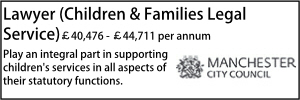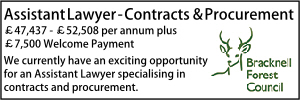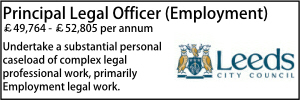
Careers
- Details
"Is there a stigma attached to being made redundant when looking for a new job?" Paul Gilbert says: "I do not believe so. The most important thing however is not to take into your search for a new role any sense of grievance about the circumstances of your redundancy. Before you embark on your new search therefore, ensure you have a proper chance to reflect and to evaluate any lessons learned, to de-personalise the events and ensure you are refreshed and focussed on the challenge ahead. Also make sure that you have a credible story to tell, not in any self-conscious way, but to show that there is no sense in which you are failing to handle the fact of your previous role’s redundancy.
Paul Gilbert says: "I do not believe so. The most important thing however is not to take into your search for a new role any sense of grievance about the circumstances of your redundancy. Before you embark on your new search therefore, ensure you have a proper chance to reflect and to evaluate any lessons learned, to de-personalise the events and ensure you are refreshed and focussed on the challenge ahead. Also make sure that you have a credible story to tell, not in any self-conscious way, but to show that there is no sense in which you are failing to handle the fact of your previous role’s redundancy.
Read Paul Gilbert's Profile Kaye Thumpston says: "This is a question we have recently raised with some of our private practice clients, and the outcome has generally been that firms and partners are happy to receive applications from candidates that have been made redundant providing they have done something productive with their free time. Good examples would be attending training courses, obtaining some consultancy or locum work, or pursuing other business interests. This is particularly important within the more commercial areas of law where remaining well-networked will be the key to your future success.
Kaye Thumpston says: "This is a question we have recently raised with some of our private practice clients, and the outcome has generally been that firms and partners are happy to receive applications from candidates that have been made redundant providing they have done something productive with their free time. Good examples would be attending training courses, obtaining some consultancy or locum work, or pursuing other business interests. This is particularly important within the more commercial areas of law where remaining well-networked will be the key to your future success.
Within Local Government I do not believe redundancy will have a stigma attached, providing good references are available and training is kept up to date. Employers within the private sector had to become much more sympathetic to redundancy situations during the recession and I would expect this to follow in the public sector following the recent cuts.
The general rule however is the longer the gap on the CV the more difficult it becomes to return to a similar role. It is therefore of key importance to be as flexible as possible when job seeking in order to minimise the amount of time spent out of work."
Will any jobs being advertised now be 'safe' from staff cuts, or should I just sit tight where I am?
- Details
"Will any jobs being advertised now be 'safe' from staff cuts, or should I just sit tight where I am?"
Katie Allen says:
 “Whilst cutbacks in the public sector are taking place, there are still new job roles being created and many exciting opportunities becoming available through natural attrition. Organisations are seeking talented individuals, including legal professionals, to help achieve a leaner and more efficient public sector – providing great opportunities to get involved during a time of significant change.
“Whilst cutbacks in the public sector are taking place, there are still new job roles being created and many exciting opportunities becoming available through natural attrition. Organisations are seeking talented individuals, including legal professionals, to help achieve a leaner and more efficient public sector – providing great opportunities to get involved during a time of significant change.
"Regardless of industry, sector or county, those looking for a change in employment should always consider their reasons for leaving and then whether the move will benefit their career in the long term. In order to feel more confident about making a move speak to the recruiting organisation and find out why the position has become available, what can be expected of the role in the future, and where the role is being funded from. Asking these questions will help professionals to make a better informed decision as to whether a role is suited to them and the likelihood of it being safe from cuts.”
Paul Gilbert says:
 "The fact that the word “safe” in the question has inverted commas around it, suggests you know the answer already. No job is safe, not really…Sitting tight however is not necessarily the alternative; if you only want to move if you perceive a role as being safe then it might be a long time before you move. We believe most lawyers will now move roles every 3-5 years; if you are factoring in job security then your assessment should be realistic, not safe for the next twenty years, but safe for three years at least would be good.
"The fact that the word “safe” in the question has inverted commas around it, suggests you know the answer already. No job is safe, not really…Sitting tight however is not necessarily the alternative; if you only want to move if you perceive a role as being safe then it might be a long time before you move. We believe most lawyers will now move roles every 3-5 years; if you are factoring in job security then your assessment should be realistic, not safe for the next twenty years, but safe for three years at least would be good.
"Even then however things change and seemingly safe roles can also disappear…The best advice I think is to ensure you discuss things as widely as you can, have the support of close family, listen to people you trust, back your judgement and make the best decision you can by thoroughly exploring concerns with the recruitment agency and with the prospective employer."

- Details
"Are private practice law firms interested in lawyers from local government? If so, what should I be emphasising when I apply to them?"
Kaye Thumpston says:
 "The demand depends a lot on your discipline within the public sector and your level of experience. More in-demand areas tend to be planning, employment, contracts and procurement, although childcare has also been a popular option over the last year.
"The demand depends a lot on your discipline within the public sector and your level of experience. More in-demand areas tend to be planning, employment, contracts and procurement, although childcare has also been a popular option over the last year.
Often, it can be easier to make the transition to Private Practice where you have only been in the public sector for a relatively short time and have previous private practice experience. Alternatively, if you are a very senior local government lawyer with good connections across the public sector, you may appeal to larger practices with specific public sector teams for business generation roles.
In applying for an opportunity within private practice it would be key to emphasise that you possess a strong sense of commerciality, and to support this with examples as far as possible. Business development will be a large element of a role in Private Practice, therefore give some thought to your contacts within local government organisations and whether you may be able to introduce work to the firm via your own network. It may also be advisable to joining local networking groups or breakfast clubs to expand your network of private practice solicitors and local business people."
Emma Khanna and Raj Sidhu say:
 "Law firms that are involved with representing local authority clients or that deal with government projects tend to be keen to take on candidates with local authority experience. However, it is essential that candidates have relevant experience in the area of law they are applying for. Examples of firms that deal with this type of public sector work include Creighton & Partners and TPP Law.
"Law firms that are involved with representing local authority clients or that deal with government projects tend to be keen to take on candidates with local authority experience. However, it is essential that candidates have relevant experience in the area of law they are applying for. Examples of firms that deal with this type of public sector work include Creighton & Partners and TPP Law.
With regards to the type of skill sets that are transferable to the private sector, generally speaking law firms will be interested in childcare, social housing and community care law. Usually law firms will request that candidates have LSC supervisor status. Planning law is also an area that comes up from time to time as being considered transferable to the private sector, as candidates that have worked within this area of law in private practice have generally had involvement with local authorities."

- Details
The ability to deal with stress is vital at any time, but particularly in this period of uncertainty. LawCare provides some useful tips on how to stay in control.
The legal profession can be a very stressful one, and prolonged stress can lead to physical problems such as headaches, high blood pressure and heart disease, as well as mental illnesses such as depression. It can also lead to family problems, since the stressed person becomes quite short-tempered, and even addiction, as some people turn to alcohol and drugs to try to cope. However, not all stress is bad – it can be a helpful motivator and prevent us from becoming bored.
Stress is your reaction to the levels of pressure upon you.
- In the first stage you may find yourself feeling overworked, uncertain of your own abilities, and reluctant to take days off.
- In the second stage you may find yourself tired, irritated and frustrated, working long hours but seeming to achieve less. You may be skipping meals, or “comfort eating”
- In the third stage you may feel resentful or guilty, you will probably be neglecting your family and friends, and will no longer be enjoying work or life
- Finally you may withdraw completely, succumb to illness or drug or alcohol abuse, feel a failure or completely break down emotionally and mentally.
It is also possible to become stressed about matters inappropriately. If you find yourself worrying or becoming unduly anxious about matters in the past, matters which you know are trivial, or things which are related to someone else and do not affect or concern you, you may need to speak to your GP or a counsellor.
Where is your stress coming from?
Identifying where your stress comes from can be a good first step in dealing with it. Is it primarily from your career, colleagues, the work itself, financial concerns or issues at home? One of the best ways to identify sources of stress is to keep a stress diary for two or three weeks. When you begin to feel stressed, look at what you are doing and what you were doing before, and note these down. Any physical symptoms, such as headaches or stomach pain, should also be noted. After a while you may see a pattern emerging, and become better at identifying what it is that makes you stressed.
Some Suggestions for Dealing with Stress
General
- Eat healthily and exercise regularly. Take good care of yourself physically.
- Give up smoking. You may think it relaxes you, but in actual fact nicotine only creates a new stress – that of craving for a cigarette.
- Cut down on the amount you drink, or avoid alcohol altogether. There is a tendency for stressed people to drink too much and this could lead to a dangerous addiction. In additon, alcohol is a depressant and is liable to make stress problems worse, not better.
- Learn to relax and unwind, perhaps by meditating or by chatting to a trusted friend or family member, or by indulging a hobby.
- Get a decent night's sleep, the longer the better.
- Plan and book a holiday with your family or friends, and ensure that the office knows that you will be off for at least a week no matter what crisis should occur, and are incommunicado. Ensure that your work is covered in your absence. Use your full holiday entitlement.
At Work
- When you are feeling very stressed, stop! Ask yourself what is the worst thing that would happen if you did not do the tasks before you, and whether it will still matter a week later.
- Protect your time by not over committing yourself. Learn to say ‘no’ and mean it.
- Be realistic about deadlines. Being over optimistic usually means increasing the pressure on yourself and letting people down later.
- Build some ‘breathing space’ into your day. When you plan the work you will do, leave a good hour or so for those little things that crop up
- Take short work breaks. Walk around the office or have a cup of coffee (not too much though!). Stretch tired muscles. A five minute break every hour will actually increase your concentration whilst reducing stress.
- Take a proper lunch break and do not work while you are eating.
- If a task seems overwhelming, break it down into bits and deal with them one at a time.
- If you are getting impatient about something, ask yourself why you are letting it annoy you. Take some deep breaths and relax!
Time Management
- Open mail with the waste paper bin handy, or get an assistant, if you have one, to sort your mail first and weed out all the junk.
- Prioritise! Put all the things you have to do in order of importance. Think about how much time each task will take, then add half that time again. In an eight hour work day you have six hours of actual working time, plus one hour for a lunch break (which is important), and another hour for unavoidable and unforeseen matters. Put everything you're not going to be able to deal with today out of the way. Then gather together all the information, files, documents and telephone numbers you'll need. The best time to do this might be first thing in the morning, or perhaps before you leave the office at night so that you can get started right away the next day.
- Each day list which tasks are essential, which you would ideally like to do if possible and what it would be good to do if you have time at the end of the day – you might like to call these you A, B, C and D lists. “Absolutely must do today”, “Best done today if possible”, “Could wait a day or two” and “Delegate or Dump”.
- If someone asks you to do another task, don't be afraid to say "If I do this I won't have time to deal with this other file. Which would you like me to do?" Let the onus of your being unable to do everything fall on someone else. Turning down additional work will not make you look half as bad as failing to do work you have accepted, or doing it badly.
- If a matter arises, such as a phone call, which isn't important, don't be afraid to say "This isn't a good time, please call back later".
- Don't subscribe to journals and periodicals you never have time to read.
- Fifteen minutes before you're due to leave work - stop working! This is the time to organise everything ready for the next day, clear away files, pat yourself on the back for getting so far through your A and B lists, and start winding down and switching off. That way you should actually be ready to leave in time to catch your train.
LawCare can be contacted on 0800 279 6888, Monday to Friday 9am to 7:30pm, Weekends/Public Holidays 10am to 4pm, 365 days of the year. Alternatively visit our website www.lawcare.org.uk for lots of really helpful information.
- Details
A recent personnel survey by London Councils has found that lawyers remain amongst the most difficult groups of professionals for councils to recruit and retain, with junior lawyers harder to find than their more experienced colleagues. Derek Bedlow reports.
Despite the impending cuts facing local authorities, local government lawyers remain in demand in many areas and none more so than those at the more junior end of the profession.
A recruitment and retention survey of London Boroughs published in the summer by London Councils found that the capital's legal departments, at least, are finding it significantly more difficult to recruit and retain junior and mid-level lawyers than senior legal advisers and managers.
Seventy-six per cent of councils in London said that they had experienced difficulty in recruiting Level I (basic professionals) lawyers and 78% said that the same of those classified as Level II (experienced professionals). By contrast, only 67% reported difficulties in hiring Level III (principal professionals) lawyers and 64% said the same of lawyers at Level IV (divisional head/head of service).
When it comes to retaining staff, the difference between senior and junior lawyers is wider still. Seventy-two percent and 76% respectively said that they they had trouble keeping lawyers at Levels I and II, but only 56% and 57% said the same of Level III and Level IV legal professionals.
Overall, lawyers remain amongst the most difficult of the 47 employee groups on the survey to recruit, despite being amongst the best-paid local authority employees, the survey found, with only social workers, engineers, planners and occupational therapists harder to recruit and retain.
Make or buy?
At first glance, this looks surprising. It might be expected that the more experienced veterans would be in greater demand than their more callow counterparts, but for a number of reasons the reverse is true.
One reason for this state of affairs is the relatively low supply of junior lawyers to local government in recent years.
According to the most recent Law Society Statistical Report, local authorities in England and Wales provided 91 training contracts in 2008/09, just 1.7% of the total number of training contracts provided by the solicitors' profession. Paltry as they are, these figures actually represent a small improvement on a decade before, when just 61 training contracts were offered in local government, 1.2% of the total.
The problem with leaving training to private practice is that during the long boom in legal services prior to 2008, relatively few newly-qualifieds saw local government as an attractive option compared to the rewards on offer in the private sector.
“Junior to mid-level lawyers are generally harder to recruit than senior lawyers within the public sector because there is often the unfair perception that large regional firms or in-house organisations offer more exciting work and better exposure,” says Katie Allen, Business Manager at Hays Legal. “This issue is also emphasised by the lack of training contracts offered within the public sector; for example they may offer one or two a year whereas a large regional firm may offer and retain over ten.”
Similarly, holding on to junior lawyers is also difficult for many local authorities, according to Kaye Thumpston, senior consultant at eNL Legal Recruitment.
“I think that retention is probably more of an issue than attraction,” she says. “Because local government has historically been a 'job for life' industry, there are naturally a lot of solicitors at very experienced levels within council legal teams. I come across many junior solicitors within local government who have become frustrated by the slower rate of progression in comparison to their private sector counterparts and so look to move sectors.”
As a result, the age and experience profile in local government is significantly higher than private practice. The current uncertainty around budget cuts is only exacerbating the situation.
“There are too many chiefs and not enough Indians” says Melissa Gudgin, consultant at Badenoch and Clark. “While local authorities don't over-promote, there is automatic promotion with seniority and people move up the pay scale. I would guess that the average PQE level is 8-10 years, maybe more. And, at the moment, people are holding on to their jobs as long as they can.”
The greater difficulties that councils encounter in hiring junior lawyers is also explained by the greater reluctance of junior lawyers to move councils, especially in the first few years of their careers.
“Junior lawyers are more likely to stay put in order to gain experience and wait until they have got more experience before they look to move,” says Hannah Cottam, director of recruitment consultants Sellick Partnership. “That applies across professional groups, not just lawyers. It is relatively easy to find NQs, and easier to find seniors, but keen and dynamic mid-levels really are in short supply”
“For more senior people, if they are offered voluntary redundancy, they often take it because they know they know they can get another job, or do a bit of locum work. It's the 'Indians' that are being kept on.”
Going private
While the future of shape of local authority legal departments is very much up in the air (see ACSeS panel identifies new models for local authority legal departments), the need for legal advisers is highly unlikely to disappear and private practice is not in a position to cost-effectively fill the gap.
One apparently obvious solution is for local authorities to recruit more from private practice, especially at at time when legal aid cuts and the downturn in commercial work is making private practice less attractive.
Yet although local authorities have been happy take newly-qualifieds from private practice, at more senior levels this has been less evident. The growing use of 'competency-based' selection criteria has made it easier for public sector legal departments to look beyond candidates with a long track record in the public sector, but many councils are still reluctant to take the perceived risk of hiring lawyers with private sector backgrounds, even in areas – such as childcare - where shortages persist.
“There are a large number of family private practice lawyers who would relish the opportunity to work in areas such as childcare, but due to the pressing nature of the work and because resources often aren’t available to train them the public sector may be missing out on a valuable source of knowledgeable, talented lawyers,” says Katie Allen at Hays.
Nevertheless, there is some evidence that this reluctance is slowly breaking down, for locums in areas of high demand at least, according to Victoria Wright, director of recruiters Law Absolute. “We are finding that our clients within local government are becoming more receptive to applications for locum posts from lawyers who have handled care work from the other side, in private practice, “ she says. “Further - this is proving successful. However, it is necessary that these lawyers truly understand care work, have a good knowledge of the Public Law Outline and can adapt to working methods and practice within local government.
Locums – experience is key
But what of those more senior lawyers that want a new challenge or find themselves in-between jobs? The good news here is that, for locum positions at least, the situation is reversed - experienced lawyers are more sought-after than junior staff and the locum market has yet to become over-supplied as a result of public spending cuts.
“For locums, people are after the experience rather than the middle-tier people and in the key areas, such as children's services, there are never enough,” says Hannah Cottam at Sellick Partnership. “Contracts and employment are also very busy, as is adult social services. Planning and property were very quiet, but that's beginning to change again. Senior lawyers have got the experience under their belts, they have a track record and they can go anywhere they like and say: look at what I've done.”
Take control of your career. Click here to visit the Career Surgery
- Details
Developments such as Tesco Law may have garnered the headlines, but Paul Gilbert highlights four key developments that are potentially even more revolutionary.
It is clear that we are working through an extraordinary time for the legal profession; there are so many factors in play that it can feel almost impossible to discern trends. There are however three significant factors that at least provide some context for this period of unprecedented change:
- The potential for significant deregulation of legal services heralded by the Legal Services Act which is forcing, at the very least, a dialogue about change
- The consequences of a deep economic recession on client perceptions of cost and value, and
- The inexorable march of technological innovation.
Many commentators have described this as a “perfect storm” for lawyers and the legal profession. The phrase “perfect storm”, in my judgement, however is completely wrong. It is resonant of uncontrollable forces resulting in an inevitable and disastrous conclusion for those unlucky enough to be caught up in it; a misfortune likely to be preceded only by one’s passive acceptance that one’s lot is up.
While I have long held to the view that change of a significant and sustained nature was bound to impact on the legal profession, I have also stated many times that this was the opportunity of a generation to shape a profession for the better. This is clearly a vulnerable time; but is also a time full of positive possibilities.
For lawyers proud of the traditions and history of the great men and women who have shaped the profession before, it is a time to protect and entrench age old ethical values that are too precious to discard; but at the same time to take the really significant strategic and operational strides forward that would have been unimaginable even ten years ago.
Change today is significant and there for all to see. For example many commentators have written about the significance of outsourcing, legal process outsourcing and off-shoring. Even more have bandied around the misnamed “Tesco Law” to speculate on the commoditisation of legal services in a consumer driven revolution that will see retail disciplines applied to professional services.
These are concepts that are real today and potentially significant for years to come; however what I want to write about are the less headline-grabbing, but nevertheless discernable trends that also suggest different models of organisation and delivery. These changes are more subtle, more interesting and will potentially make an even bigger impact.
The problem with “Tesco Law” is that it has become a cliché; there is no longer any analysis, instead it is the unquestioned apotheosis of a deregulated market. In reality I suspect that while the productisation of legal services will continue at a pace; the supermarkets will not be suppliers of legal services, they will be the retailers of personal legal services.
It is entirely reasonable therefore to view such a development as one where lawyers and law firms will benefit. In effect it provides another channel of delivery for their talent and know-how, not a denial of their living.
Off-shoring and legal process outsourcing are more interesting. Law firms (and perhaps some of the biggest corporate and public sector in-house teams) will increasingly view this as an opportunity to take cost out of their processes. This is a little like car assembly plants where the components are manufactured in cheaper lands far away, but assembled and badged in Sunderland or Swindon (or in the case of legal services closer to the Square Mile or Wall Street). For legal services it offers the potential for quality to be reassured through the brand of the supplier, but for the supplier to manage their cost base more effectively and certainly. In a significant way therefore outsourcing and off-shoring is about profit preservation and less about innovation.
What then are the changes that might make an even bigger impact? I think there are four very different and quite subtle shifts in temperament and style that have the potential to be truly revolutionary. I also think that these ideas, while they are not widely seen today, are the very essence of entrepreneurialism; in ten years time I believe we will look back and see their true worth as pointing the way to a completely different approach to legal services. The four ideas can be summed up in this way:
1. Knowledge is power
Centuries ago the printing of books began a revolution in the dissemination of information that empowered the education of the working classes and accelerated innovation in commerce, the arts and in the sciences. The internet revolution of the last decade is our equivalent today and is doing the same, but in an exponential way. Legal services are being caught up in this revolution too.
Access to justice, in terms of court representation, may still depend for now on the interpretive skills of advocates, but this is only a small part of the access issue. The major players in legal content publishing, companies such as Lexis Nexis and Practical Law Company, have established extraordinarily powerful bases. I am not a great techno-phile, but the pace of development in mobile technology, in searchable databases, in “intelligent” algorithms brings legal expertise to a far broader audience than ever before.
This is the democratisation of legal services and will drive cost down, in most cases, to a negligible level. Where once a lawyer could charge their time to assess, research and advise, in future a few clicks will give most people most of what they want. I am not judgemental about this and there is clearly risk (for lawyers and consumers) for all to see, but where good is good enough no one can deny the incredible opportunity that the publishers have to bring about unprecedented access to legal expertise that will change commerce, dispute resolution, protection of rights etc for ever.
2. Price reduction for richer for poorer
In this world where we pay less and less for the gift of knowledge, will we pay more and more for the wrapping?
I have lectured for years now on this theme; on the one hand even the most discerning purchasers of legal services struggle to articulate how they differentiate between providers in terms of the quality of legal expertise deployed. Yet on the other hand we are all capable of assessing whether the elements of the service we receive are acceptable. These elements, such as the accessibility of lawyers, the clarity of their communication, their understanding of context, nuance, tolerance to risk, and empathy with the client, etc, are factors we all assess all of the time.
The inevitable conclusion we reach is that value (and therefore profit) will be attributed to the service we receive, not to the legal advice itself. Obviously we will expect (perhaps even assume) that the legal content will be good enough and this is perhaps the role for regulators going forward to provide the quality standard we need, but in very many ways what we will increasingly pay for will be the quality of the interaction.
The providers of legal services therefore, especially providers who are not dealing in the high-end consulting services (the mega-deals, the inter-governmental activity etc) but who are working in the broad swathe of corporate, commercial and consumer law must drive down the cost of their “product” while driving up the value of the service. This is something that we can see today in a variety of areas that are not obviously linked.
At one level law firms have become used to pricing the component elements of a transaction or dispute, in effect unbundling their service. This has encouraged a detailed examination of process and procedure that has improved efficiency and has also challenged law firms to consider what elements of a service/process are ones that clients might pay for and those which might have to be priced at a loss, even given away for free.
At another level the claims handling legal services that are provided to the biggest insurance companies focus value on the quality of the management information, the trends analysis and the efficiency improvements. This is as far removed as you can get from the traditional “wig and pen” caricature of lawyers and is in the same space occupied by serious process engineers and logistics management experts.
Moving into the transactional realm, the quality of relationships between lawyer and client still has significant influence. In this area of activity if the client is made to feel valued it will help the lawyer to articulate value. However this is a very vulnerable space which is always likely to be undercut at all times by the latest iteration of process improvement or technological advancement. The only realistic way in which this segment of market activity can be protected is to tie-in the client to a genuinely creative and important value-add proposition.
What does this mean? It means, for example, providing exclusive and insightful thought leadership to clients so that being a client ensures access to relevant and helpful strategic guidance on market/sector trends. Law firms that can leverage their position of privileged access across markets, from regulators, to suppliers and to consumers can draw trends, point to developments and opportunities and so can create competitive value for their clients. Value-add also means supporting the clients’ own resources for managing risk more effectively. This might be through training programmes, systems development and/or adding people to the in-house team.
The logical extreme of the approach will see legal content reducing in cost often to a point where it is free, but where the profitability of the supplier is developed through bundled “membership” services, through resource management, access to know-how systems and strategic advisory services.
3. The public sector collaboration
Lawyers who worked in in-house teams twenty years ago were often maligned by lawyers in law firms. They were not “good enough” to cut it in a law firm. Similarly, lawyers in in-house teams in commerce and industry would sometimes look at lawyers in public sector in-house teams and be equally judgemental. Whatever the weakness of the arguments 20 years ago, the position today is very different to that perception.
The public sector is now a major driving force for change in the profession. Major players have emerged who have a dynamic, sometimes controversial profile and the debate on the future of legal services is being shaped by their influence.
Kent County Council is one obvious example of this recent phenomenon, but they are by no means the only player. The opportunity for the public sector to transform itself is partly a natural evolution (taking advantage of technology and know-how management) and partly driven by the necessity to demonstrate value at a time of considerable austerity in the public finances. What Kent County Council have done however, under the strategic leadership of Geoff Wild, is to prove that entrepreneurialism can be harnessed to create value, career opportunities and innovation in even the most conservative of environments.
Now lawyers in the Kent County Council legal department provide services to other public sector bodies both on their own account and in collaboration with a law firm partner. The intention is to do this not just within their geographical/political boundary, but across the country.
Whether Wild succeeds in the longer term in his South East stronghold will depend on any number of factors; his vision however should not be judged just by the results that he achieves for the good people of Kent, but by the release of energy that initiatives like his have unleashed across the public sector.
Legal services in the public sector will be increasingly based on shared resources that combine to form virtual teams that capture and reuse know-how and which join-up people and organisations to make a more efficient, more expert and more relevant service to a broader group of users and consumers .
The ambition will be to reduce the bottom line cost of delivery without any adverse impact on quality and a significant outcome of working collaboratively will also be pro-active identification of opportunities to offer new services without incurring additional costs. Done well this will create, encourage, develop and embed multi-functional, cross-agency, real and virtual teams that come together for specific initiatives or which have sufficient common interests that they collaborate on a long term basis.
Public sector lawyers are setting the agenda already with shared panels of external law firms and joint ventures between in-house teams and law firms willing to co-operate to provide legal services both internally and to other agencies. One senses that the extent of change in this sector has only just begun.
4. The integrated solution
Much of the ground explored in this paper so far is also revealed in the final development I want to describe. It is potentially one of the most significant developments in legal services for decades shifting not just the perception of operational effectiveness, but redefining what legal services are and what they mean to clients. The Managed Legal Services (MLS) proposition from Berwin Leighton Paisner (BLP) is game changing.
The proposition came to public prominence when BLP announced a deal with Thames Water. The issues being faced by Thames Water were common to many businesses and the lawyers they employ in their in-house teams. These are issues I see in very many of the teams I work with every day.
- How to manage an increasing demand for quality legal support with capped or reducing budgets?
- How to manage a multi-firm panel for value and build mutually supporting relationships?
- How to create a strategic role that plays to the strengths of the in-house team while demonstrating efficiency in the way significant volumes of operational activity are being managed?
- How to provide a career path to ambitious and talented in-house lawyers in a flat and opportunity constrained structure?
BLP seeing this concluded that offering different pricing arrangements without more was not the answer. They considered that they would have to be more innovative and re-think the way legal services are managed and delivered. In effect BLP concluded that the traditional methods of employing an in-house team and selecting and managing a law firm panel were potentially constraining some aspects of collaboration and innovation.
John Bennett, the partner heading the MLS operation for BLP, recognised these tensions and shortcomings. Encouraged by clients he came forward with a new model. It is a model, underpinned by intelligent multi-sourcing and proprietary information technologies, that is cheaper, better and simpler for the client. The model also supports the transferring members of the in-house team with excellent training, know-how, systems and processes.
Thames Water has transferred their legal team (other than a core retained function) to BLP to resource their legal services requirements with an appropriate blend of lawyers working on-site from the previous in-house regime and expert teams working within BLP and its legal service partners. All are provided by BLP and covered by insurance and extended privilege. In relation to each assignment the tasks are allocated by the BLP on-site management team according to capability, efficiency and the need to achieve guaranteed performance standards.
John Bennett and the MLS team see this as a strategy that can support a great many larger organisations which are significant users of legal services, but I see it having an even wider appeal.
The collaboration has a resonance with many of the points made in this paper and brings together a solution that is client centric, innovative and collaborative. Not every client will want to be so embedded in one law firm, but many will see great value in a partnership which will deliver resourcing flexibility, efficiencies, greater pricing certainty, enhanced legal risk management and systems, processes and resources which enable the lawyers to be more effective.
It is also possible to see the model working for discrete elements of the legal services required by an organisation; so for example for all the employment work or all of the contract work etc. The principle and approach are the same.
Bennett describes MLS as an “optimum solution to maximise value”, not a phrase may law firm partners would have been comfortable using ten years ago, but it is hard to argue. Thames Water now have access to as much dedicated legal services supply as they need; lawyers working for Thames Water have great know-how and systems at their fingertips and by combining the former in-house team with the law firm new career opportunities are created for the in-house lawyers as well.
The key to this model’s long-term success however will be ensuring that this is not a shotgun marriage, but a creative combination of common interests. The work that is done in setting-up the arrangements, with real thoughtfulness and care, will be crucial; but more than that will be a need to thoroughly assess the value of legal services needed and then to focus on delivering and articulating value at every turn.
Bennett describes BLP as being “the manager of value added consulting services” and if ever there was a statement of how far the legal profession has come in recent years, that is it. It is the future today.
Paul Gilbert is Chief Executive of LBC Wise Counsel, the UK based specialist management and skills training consultancy for lawyers. www.lbcwisecounsel.com
Careers News Article Count: 529
Careers Features Article Count: 142
Page 107 of 112
Head of Governance & University Solicitor
Senior Lawyer - Advocate
Assistant Director - Legal & Governance
Director of Legal and Governance (Monitoring Officer)
Events

 Back to Basics: Construction Insurance and Insolvency - Devonshires
Back to Basics: Construction Insurance and Insolvency - Devonshires
16-07-2025 2:00 pm
Online (live)
 Institutional landlord series: Service and Notices – from Possessions to Injunctions and Requests for Access - 5 Pump Court
Institutional landlord series: Service and Notices – from Possessions to Injunctions and Requests for Access - 5 Pump Court
16-07-2025 4:00 pm
Online (live)
 HMPL Building Blocks: Tackling Non-occupation and Sub-letting - Devonshires
HMPL Building Blocks: Tackling Non-occupation and Sub-letting - Devonshires
17-07-2025
Online (live)
 To establishing whether Material Changes of Use have occurred - Ivy Legal Training
To establishing whether Material Changes of Use have occurred - Ivy Legal Training
18-07-2025 9:30 am
Online (live)
 Business and Property Masterclass #5: Interim Relief – Acting urgently and getting it right - Cornerstone Barristers
Business and Property Masterclass #5: Interim Relief – Acting urgently and getting it right - Cornerstone Barristers
10-09-2025 11:00 am
Online (live)
 Business and Property Masterclass #6: Rights of Light and Restrictive Covenants - Cornerstone Barristers
Business and Property Masterclass #6: Rights of Light and Restrictive Covenants - Cornerstone Barristers
23-09-2025
Online (live)
 HMPL Building Blocks: Service Charges & Ground Rent – Tackling Leasehold and Shared Ownership Arrears - Devonshires
HMPL Building Blocks: Service Charges & Ground Rent – Tackling Leasehold and Shared Ownership Arrears - Devonshires
14-10-2025
Online (live)
 Institutional landlord series: Possession – High Court Enforcement - 5 Pump Court
Institutional landlord series: Possession – High Court Enforcement - 5 Pump Court
22-10-2025 4:00 pm
Online (live)
 Institutional landlord series: Costs Recovery and Legally Aided Parties - 5 Pump Court
Institutional landlord series: Costs Recovery and Legally Aided Parties - 5 Pump Court
05-11-2025 4:00 pm
Online (live)
 HMPL Building Blocks: Law and Procedure Following Death of a Tenant - Devonshires
HMPL Building Blocks: Law and Procedure Following Death of a Tenant - Devonshires
09-12-2025
Online (live)
 HMPL Building Blocks: Legal Tools to Combat Anti-Social Behaviour - Devonshires
HMPL Building Blocks: Legal Tools to Combat Anti-Social Behaviour - Devonshires
17-02-2026
Online (live)

















































 A-Z Family Law: Take Two! - 42 Bedford Row
A-Z Family Law: Take Two! - 42 Bedford Row  Executive Programme in Public Procurement Law and Policy - University of Nottingham
Executive Programme in Public Procurement Law and Policy - University of Nottingham  Property Law Roadshow 2025 - Bristol - St John's Chambers
Property Law Roadshow 2025 - Bristol - St John's Chambers  CUBAS Comprehensive Training & Licencing (Manchester), September 2025
CUBAS Comprehensive Training & Licencing (Manchester), September 2025  AI in the Public Sector Conference - Westminster Insight
AI in the Public Sector Conference - Westminster Insight  Activism in the Workplace - 42BR Barristers Employment Law Annual Lecture
Activism in the Workplace - 42BR Barristers Employment Law Annual Lecture  DoLS Authoriser Training - LPS Law
DoLS Authoriser Training - LPS Law  Property Law Roadshow 2025 - Cardiff - St John's Chambers
Property Law Roadshow 2025 - Cardiff - St John's Chambers  Annual Fraud Conference 2025 - Oxford Investigation Service
Annual Fraud Conference 2025 - Oxford Investigation Service